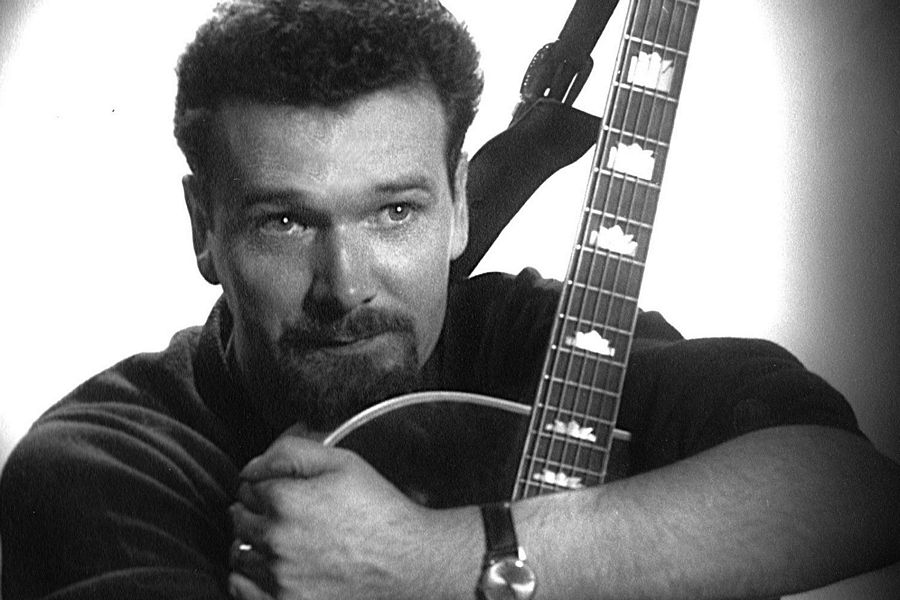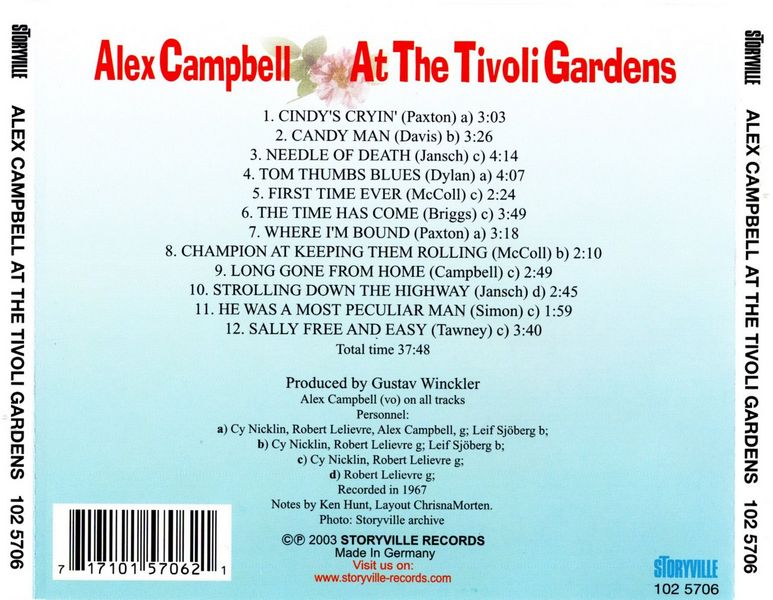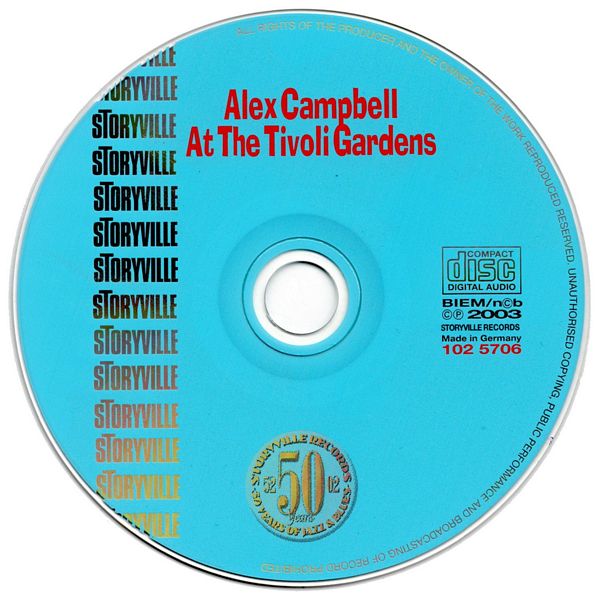

 |


|


|
Sleeve Notes
So much hot air and so many column inches have been expended on Beatlemania, Carnaby Street, mini-skirts and the other accoutrements of Swinging London that they have blotted out memories of a very different, if far more modest, British Invasion that occurred concurrently. This other invasion may not have made so much money for the Chancellor of the Exchequer as the Beatles' "Taxman", but it helped lay the foundations for a series of overlapping European folk scenes decades before 'networking' in its modem sense had ever occurred to anyone. As sepia turned to kaleidoscopic Technicolor, a succession of British folk acts headed for the European mainland. Alex Campbell was in the vanguard of British folkies to savour the forbidden fruits of the 'Continent'.
It is difficult to imagine the sheer parochialism that was rife in Britain for almost all of the twentieth century. For generations, the majority of working-class Brits who went abroad went wearing battledress, scarlet, khaki or whatever colour reflected the day's fashion for killing. Britain's currency regulations introduced in 1947 meant that it was damned hard to get far abroad unless you had broken the currency restrictions or had a magic hitchhiking thumb. In 1956 Alex Campbell (1925-1987) was amongst the first to use the guitar as an international passport. His success in Paris reached home like letters from abroad carrying foreign scents. Others scrambled to follow his example.
During the first half of the 1960s, another country increasingly beckoned British folkies and that was Denmark. Following in the footsteps of George Bryan, Will Kempe and Thomas Pope, an earlier Elizabethan breed of travelling player and each an actor on the Danish payroll at Kronborg Castle, influxes of British and American folkies such as the Ian Campbell Folk Group, the McCalmans, Alex Campbell and Paul Simon found the Danish folk scene a welcoming place. It was the start of another artistic invasion and liberation. An era of folkie internationalism had arrived.
The Scottish singer and guitarist Alex Campbell had blown into Copenhagen in the summer of 1965, engaged to play at Walther Klæbel's Folk Club of Denmark on Copenhagen's Dahlerupsgade. He was 40 and hardened by nine years as a professional musician. (In 1978, talking to Karl Dallas, he would express amazement that he had managed to turn folk music into a career. Nobody but nobody on the British folk scene had believed that playing folk music could provide them with a livelihood let alone become a career.) In Denmark Campbell got to play for university and folk club audiences and even broadcast on national radio. At some point during this tumble of dates, the suggestion arose that he record. He agreed. The upshot was his first album for Storyville: Alex Campbell in Copenhagen.
In 1967 he recorded his second album for the label, Alex Campbell at the Tivoli Gardens, named after Copenhagen's famous pleasure park. This time various combinations of Cy Nicklin and Robert Lelievre, two thirds of the Copenhagen-based folk trio Cy, Maia & Robert, backed him up on guitars (Maia Aarskov had accompanied on Alex Campbell in Copenhagen) with Leif Sjöberg on bass.
Unlike his first album for the label, the Tivoli Gardens set never strays into the traditional. This is contemporary folk. Except for his own "Long Gone From Home" he concentrates on the work of his peers, with material from Annie Briggs, Bob Dylan, Bert Jansch, Ewan MacColl, Tom Paxton, Paul Simon and Cyril Tawney. Many of the songs, "Sally Free And Easy" and "First Time Ever I Saw Your Face" in particular, had already entered the standard repertoire. Campbell lays out his table with a triptych of temptation. This opening flourish of hard-edged songs begins with Tom Paxton's "Cindy's Cryin'" about a girl hooked on drugs destined to be "a hooker on Bleeker Street" in New York. He juxtaposes it with Rev. Gary Davis' "Candyman" and Bert Jansch's "Needle of Death", a song about the deterioration, decline and death of Jansch and Campbell's mutual friend Buck Polley in June 1964 that would rattle people as different as Sydney Carter, Julie Felix and Neil Young. Dylan's "Tom Thumb's Blues" had opened Judy Collins' masterpiece In My Life released the same year as Tivoli Gardens. Nicklin and Lelievre's guitar accompaniment on Annie Briggs' "The Time Has Come" conjures a feel as different from its author's as Pentangle's version would on next year's Sweet Child album. Ewan MacColl's "First Time Ever I Saw Your Face", written for Peggy Seeger, captures a different twinkle in both their eyes (but, to Campbell's eternal credit, no nudge-nudge-wink-wink leer). In 1959 Campbell had married the American folksinger in Paris so she could gain legal entry to Britain and join MacColl, her next husband as it were. In keeping with Campbell's carefully maintained image, "Where I'm Bound", "The Time Has Come", "Long Gone From Home" and "Strolling Down The Highway" spin a web of themes on the general subject of rambling.
In retrospect, there are several things that single out this period of Alex Campbell's recording career. If he comes across as a sponge, he was a most discriminating one when it came to soaking up songs. To some extent Alex Campbell has been marginalized in accounts of the folk revival. But his influence continues to ripple outwards. Listening to his two Storyville albums must raise questions about the impact of his phrasing and intonation on Christy Moore — in 1967 two years away from making his debut record.
Denmark was important for Alex Campbell. It was very important for a number of foreign folkies at various stages in their career but whereas, say, Sandy Denny and the Strawbs just passed through (making an album on the way) or Martin Carthy and Dave Swarbrick took up temporary residence (while playing in Stig Lommer's Lommerlei for most of 1967), Campbell settled down in Denmark and indeed died in Åbenrå, not far from the present-day German border. No wonder that in his life he had berated the British music press for ignoring the likes of Wolf Biermann, Hannes Wader and Niels Hausgaard. Campbell was somebody who helped shape the British and European folk scenes. The word legend gets bandied about a great deal but Alex Campbell was a European folk legend.
Ken Hunt
June 2002
Ken Hunt is the author of Prince Heathen: Martin Carthy and the English folksong revival (2003)